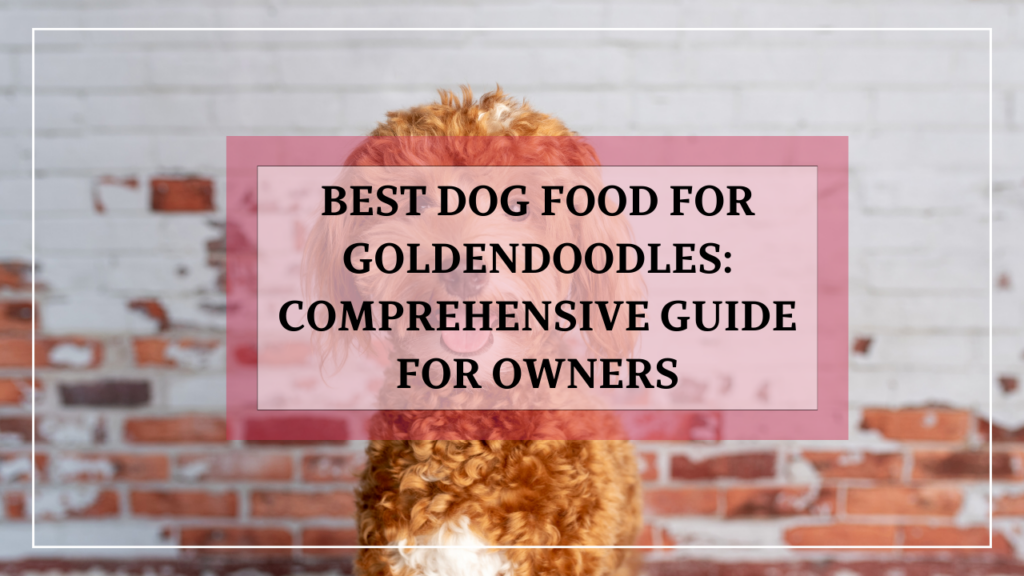Goldendoodles, a delightful mix of Golden Retrievers and Poodles, have quickly become one of the most popular dog breeds in recent years. Their friendly temperament, intelligence, and hypoallergenic coats make them a favorite among dog lovers. However, like all breeds, Goldendoodles have unique dietary needs that are essential to their overall health and well-being. Choosing the right dog food for your Goldendoodle can be challenging with so many options available, but understanding their specific nutritional requirements can make this task easier.
In this comprehensive guide, we’ll explore the best dog food options for Goldendoodles, taking into account their specific needs at different life stages, potential allergies, and health concerns. We’ll also provide practical tips on how to select the right food, whether store-bought or homemade, and offer advice on feeding schedules, portion sizes, and much more. Let’s dive into the world of Goldendoodle nutrition and help you make the best choices for your furry friend.
Understanding Goldendoodles’ Nutritional Requirements
What Makes Goldendoodles Unique?
Goldendoodles are a hybrid breed, a cross between the Golden Retriever and the Poodle, each of which contributes distinct characteristics to the breed. Their size can vary significantly, with some being as small as 15 pounds (Mini Goldendoodles) and others weighing up to 90 pounds (Standard Goldendoodles). This size variation means that their nutritional needs can differ greatly, depending on the specific type of Goldendoodle you have.
One of the key aspects that make Goldendoodles unique is their predisposition to certain health issues, some of which can be managed or mitigated through proper nutrition. For instance, like their Golden Retriever ancestors, Goldendoodles are prone to hip dysplasia, a condition that can be exacerbated by obesity or a lack of joint-supporting nutrients such as glucosamine and chondroitin. Additionally, they can inherit the Poodle’s sensitive digestive system, making them more susceptible to food allergies and intolerances.
Understanding these breed-specific concerns is crucial when selecting the best dog food for your Goldendoodle. A diet rich in high-quality protein, healthy fats, and essential vitamins and minerals can help support their overall health, keep their coats shiny, and provide the energy they need to stay active and happy.
Essential Nutrients for Goldendoodles
Goldendoodles require a balanced diet that provides all the essential nutrients they need for growth, maintenance, and overall health. Here are the key nutrients that should be included in their diet:
- Protein:
- Importance: Protein is vital for muscle development, repair, and overall health. It provides the building blocks (amino acids) needed for various bodily functions.
- Recommended Sources: Look for dog foods that list high-quality, named protein sources like chicken, beef, fish, or lamb as the first ingredient. For dogs with allergies, novel proteins like duck or venison may be beneficial.
- Fats:
- Importance: Fats are a concentrated source of energy and are crucial for maintaining healthy skin and a shiny coat. They also aid in the absorption of fat-soluble vitamins.
- Recommended Sources: Look for sources like chicken fat, fish oil, and flaxseed. Omega-3 and Omega-6 fatty acids are particularly beneficial for Goldendoodles.
- Carbohydrates:
- Importance: While not as essential as proteins and fats, carbohydrates provide energy and aid in digestion. They also supply fiber, which is important for digestive health.
- Recommended Sources: Whole grains like brown rice, oats, and barley are good options. For grain-sensitive dogs, alternatives like sweet potatoes and peas are excellent choices.
- Vitamins and Minerals:
- Importance: Vitamins and minerals are essential for various bodily functions, including immune support, bone health, and overall growth.
- Recommended Sources: Ensure the dog food includes a balance of vitamins (A, D, E, K, B-complex) and minerals (calcium, phosphorus, zinc, iron) either through whole food sources or supplements.
Goldendoodle Age-Specific Nutritional Needs
Goldendoodles’ nutritional needs change as they age, and it’s important to adjust their diet accordingly:
- Puppy Goldendoodles:
- Growth and Development: During the first year, Goldendoodle puppies require a diet high in protein and fat to support their rapid growth and development. DHA, an omega-3 fatty acid, is particularly important for brain development.
- Feeding Guidelines: Puppies should be fed specially formulated puppy food that meets the nutritional requirements set by the AAFCO. Look for foods that offer balanced nutrition and are free from fillers.
- Adult Goldendoodles:
- Maintenance and Energy: Once they reach adulthood, Goldendoodles need a balanced diet that maintains their energy levels without contributing to excessive weight gain. The focus should be on maintaining lean muscle mass and supporting overall health.
- Feeding Guidelines: Adult Goldendoodles should transition to adult dog food around the age of 12-15 months. Portion control is important to prevent obesity, a common issue in this breed.
- Senior Goldendoodles:
- Joint Support and Reduced Calories: As Goldendoodles age, their metabolism slows down, and they may become less active. Senior dog foods are typically lower in calories and contain joint-supporting nutrients like glucosamine and chondroitin.
- Feeding Guidelines: Senior Goldendoodles may benefit from a diet tailored to their specific needs, such as reduced calorie intake to prevent weight gain and enhanced joint support to manage age-related issues like arthritis.
Top Considerations When Choosing Dog Food for Goldendoodles
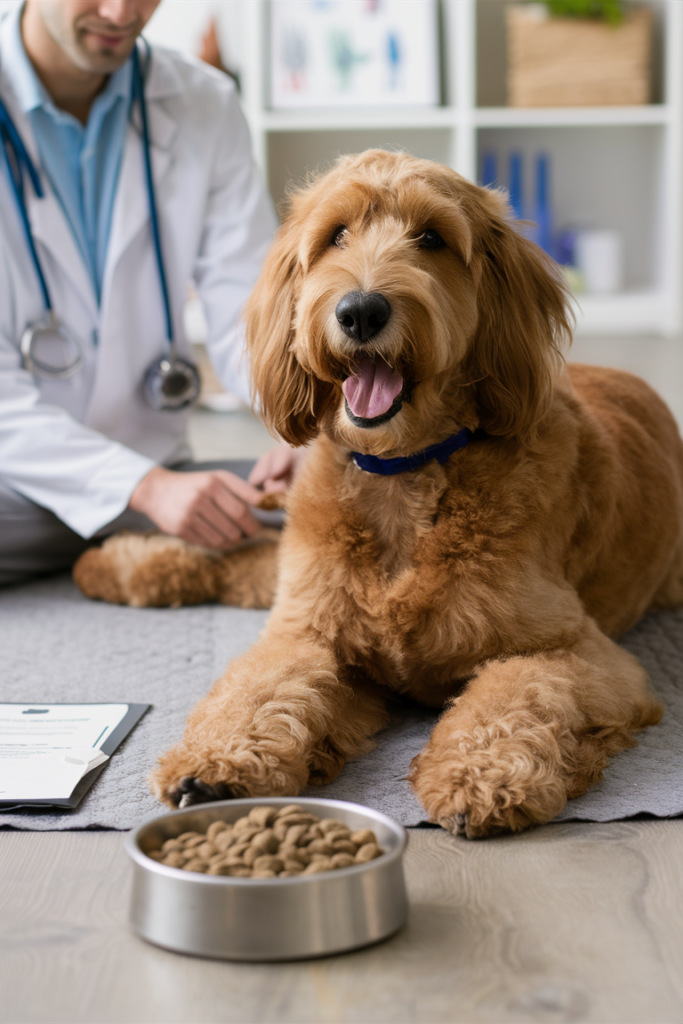
Choosing the best dog food for your Goldendoodle involves more than just picking a brand off the shelf. It requires careful consideration of several factors to ensure that the food you choose meets your dog’s unique nutritional needs and supports their overall health. In this section, we’ll explore some of the most important considerations to keep in mind.
Wet vs. Dry Dog Food for Goldendoodles
One of the first decisions you’ll need to make when choosing dog food is whether to feed your Goldendoodle wet or dry food. Each type has its pros and cons, and the best choice will depend on your dog’s specific needs and preferences.
Wet Dog Food:
- Pros:
- Hydration: Wet dog food has a high moisture content, which can help keep your Goldendoodle hydrated, especially if they are not keen on drinking water.
- Palatability: Wet food is often more flavorful and aromatic, making it a great option for picky eaters.
- Easy to Chew: Wet food is softer, making it easier for puppies, seniors, or dogs with dental issues to eat.
- Cons:
- Dental Health: Wet food does not provide the same dental benefits as dry food, such as scraping off plaque and tartar.
- Cost: Wet dog food is generally more expensive than dry kibble.
- Storage: Once opened, wet food needs to be refrigerated and used within a few days to prevent spoilage.
Dry Dog Food:
- Pros:
- Dental Health: Dry kibble can help maintain dental hygiene by reducing plaque and tartar buildup as your dog chews.
- Convenience: Dry food is easier to store, has a longer shelf life, and can be left out without spoiling.
- Cost-Effective: Dry dog food is usually more affordable and available in larger quantities.
- Cons:
- Hydration: Dry food has low moisture content, which means you need to ensure your Goldendoodle drinks plenty of water.
- Palatability: Some dogs may find dry kibble less appealing compared to wet food, especially if they are picky eaters.
Conclusion: For most Goldendoodles, a combination of wet and dry food can offer the best of both worlds. You can mix wet food with dry kibble to enhance flavor and provide hydration while still maintaining the dental benefits and convenience of dry food.
Grain-Free vs. Grain-Inclusive Diets
The debate between grain-free and grain-inclusive diets has been a hot topic among dog owners and veterinarians alike. Understanding the differences between these diets can help you make an informed decision for your Goldendoodle.
Grain-Free Diets:
- What It Is: Grain-free dog food replaces grains like wheat, corn, and rice with alternative carbohydrate sources such as sweet potatoes, peas, or lentils.
- Potential Benefits:
- Allergy Management: Some Goldendoodles may have grain sensitivities or allergies, leading to symptoms like itchy skin, ear infections, or digestive issues. A grain-free diet can help alleviate these symptoms.
- Weight Management: Grain-free diets are often lower in carbohydrates, which can help with weight control.
- Potential Risks:
- Nutritional Imbalance: Some grain-free diets may lack certain nutrients that are present in grains, such as specific B vitamins and fiber.
- Heart Health Concerns: There have been concerns about a potential link between grain-free diets and canine dilated cardiomyopathy (DCM), a heart condition. It’s important to consult with your veterinarian before making any drastic changes to your dog’s diet.
Grain-Inclusive Diets:
- What It Is: Grain-inclusive dog food includes grains like brown rice, barley, oats, or quinoa as part of the carbohydrate content.
- Potential Benefits:
- Balanced Nutrition: Grains provide essential nutrients like B vitamins, fiber, and energy, which are important for your dog’s overall health.
- Digestive Health: The fiber in grains can help promote healthy digestion and prevent issues like constipation.
- Potential Drawbacks:
- Allergies: If your Goldendoodle has a known grain allergy, a grain-inclusive diet may exacerbate symptoms.
Conclusion: The decision between grain-free and grain-inclusive diets should be based on your Goldendoodle’s specific health needs and any advice from your veterinarian. If your dog has a grain allergy or sensitivity, a grain-free diet may be beneficial. However, for most dogs, a grain-inclusive diet provides a balanced and nutritious option.
Reading Dog Food Labels: What to Look For
Understanding how to read dog food labels is crucial for making informed decisions about what you feed your Goldendoodle. Here’s a breakdown of the key elements to look for on a dog food label:
- Ingredients List:
- First Ingredient: Ensure that a high-quality, named protein source (e.g., chicken, beef, salmon) is listed as the first ingredient. This indicates that the food has a high protein content, which is essential for your Goldendoodle’s muscle health.
- Avoid: Ingredients like “meat by-products” or “animal digest,” which are low-quality protein sources. Also, steer clear of artificial preservatives (e.g., BHA, BHT), artificial colors, and flavors.
- Guaranteed Analysis:
- Nutrient Content: The guaranteed analysis lists the minimum and maximum percentages of nutrients such as crude protein, crude fat, fiber, and moisture. This information helps you compare the nutrient content of different dog foods.
- AAFCO Statement: Look for a statement that the food meets the nutritional standards set by the Association of American Feed Control Officials (AAFCO) for your dog’s life stage (e.g., growth, maintenance, all life stages).
- Calories per Cup:
- Portion Control: Knowing the caloric content helps you determine the appropriate portion size for your Goldendoodle, preventing overfeeding and weight gain.
- Feeding Guidelines:
- Manufacturer’s Recommendations: Most dog food packages include feeding guidelines based on your dog’s weight and activity level. These are general recommendations, so you may need to adjust based on your dog’s specific needs.
Conclusion: By carefully reading and understanding dog food labels, you can make more informed choices that will benefit your Goldendoodle’s health and well-being. Always prioritize high-quality ingredients and balanced nutrition tailored to your dog’s life stage.
Best Commercial Dog Foods for Goldendoodles
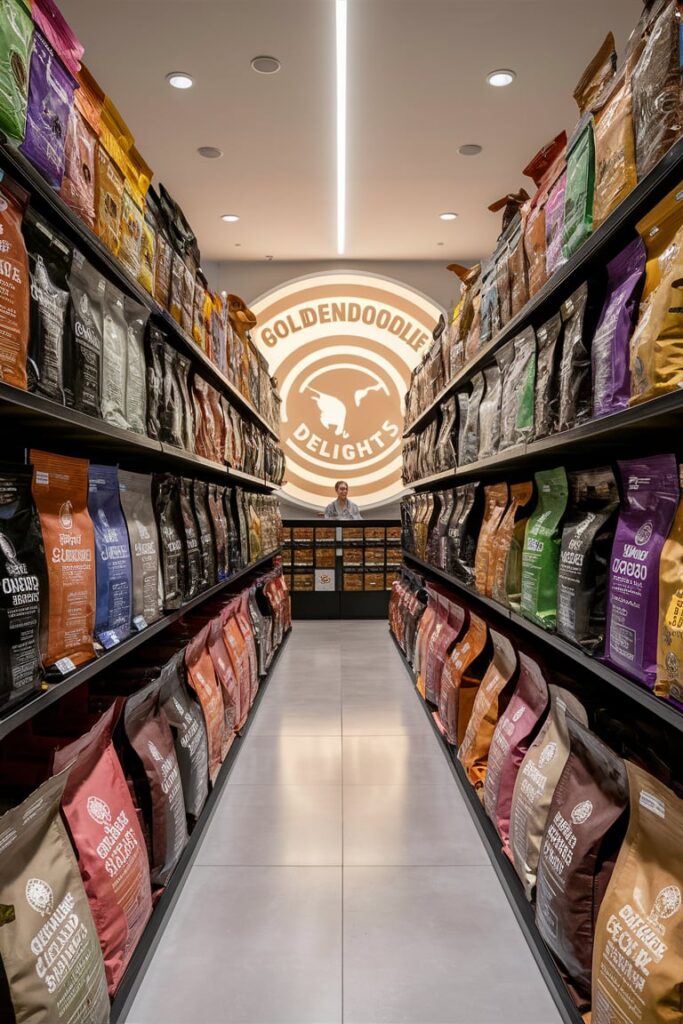
When selecting the best commercial dog food for your Goldendoodle, it’s essential to choose products that meet their specific nutritional needs. The market is flooded with options, making it challenging to know which brands are trustworthy and beneficial for your dog. Below, we’ve compiled a list of some of the top-rated dog foods that are well-suited for Goldendoodles, along with a detailed analysis of their ingredients, benefits, and potential drawbacks.
Top Picks for Puppy Goldendoodles
Puppy Goldendoodles require a diet that supports their rapid growth and development. The following dog foods are specifically formulated to meet the high nutritional demands of puppies.
1. Royal Canin Puppy Medium Dry Dog Food:
- Overview: Royal Canin is known for its breed-specific formulas, and while this isn’t Goldendoodle-specific, it’s designed for medium-sized breeds like Goldendoodles.
- Key Ingredients: Chicken by-product meal, corn, wheat gluten, brewers rice, chicken fat, fish oil.
- Benefits:
- Tailored Nutritional Profile: Designed to support the high energy needs and bone development of puppies.
- Digestive Health: Contains highly digestible proteins and prebiotics to support a puppy’s developing digestive system.
- Balanced Growth: Includes an optimal calcium and phosphorus ratio to support healthy bone and joint development.
- Drawbacks:
- Common Allergens: Contains corn and wheat, which may not be suitable for puppies with grain sensitivities.
- By-Products: Some dog owners prefer foods without by-products, although Royal Canin’s are high-quality.
2. Blue Buffalo Life Protection Formula Puppy:
- Overview: Blue Buffalo is known for its high-quality, natural ingredients, making it a popular choice among dog owners.
- Key Ingredients: Deboned chicken, chicken meal, brown rice, oatmeal, fish meal, flaxseed.
- Benefits:
- High-Quality Protein: Deboned chicken as the first ingredient ensures a high protein content for muscle development.
- Brain and Eye Development: Contains DHA and ARA, important fatty acids found in mother’s milk, which support cognitive function and retinal health.
- Immune System Support: Rich in vitamins, minerals, and antioxidants from real fruits and vegetables.
- Drawbacks:
- Price: Blue Buffalo tends to be on the pricier side, which might be a consideration for some pet owners.
- Potential for Allergies: Some dogs may be sensitive to chicken, which is the primary protein source.
Best Dog Food for Adult Goldendoodles
Adult Goldendoodles need a balanced diet that maintains their energy levels and supports overall health. The following options are excellent choices for adult Goldendoodles.
1. Wellness CORE Grain-Free Original:
- Overview: Wellness CORE is a protein-rich, grain-free formula designed for active adult dogs.
- Key Ingredients: Deboned turkey, turkey meal, chicken meal, peas, potatoes, chicken fat, flaxseed.
- Benefits:
- High Protein Content: The first three ingredients are high-quality animal proteins, supporting muscle health.
- Grain-Free: Ideal for dogs with grain sensitivities or allergies.
- Nutrient-Dense: Contains a blend of antioxidants, probiotics, vitamins, and minerals for overall well-being.
- Drawbacks:
- High Caloric Content: May not be suitable for less active Goldendoodles due to the high-calorie content.
- Cost: Being a premium product, it comes with a higher price tag.
2. Hill’s Science Diet Adult Large Breed:
- Overview: Hill’s Science Diet is veterinarian-recommended and formulated for large breed adults like Standard Goldendoodles.
- Key Ingredients: Chicken, cracked pearled barley, whole grain wheat, whole grain corn, brown rice, chicken meal.
- Benefits:
- Joint Health: Contains glucosamine and chondroitin for joint support, which is essential for larger breeds prone to hip dysplasia.
- Digestive Health: Highly digestible ingredients and a balanced blend of fibers promote healthy digestion.
- Weight Management: Formulated to help large breeds maintain an ideal body weight.
- Drawbacks:
- Grain-Inclusive: Includes grains like wheat and corn, which may not be suitable for all dogs.
- Chicken as Main Protein: Dogs with chicken allergies will need an alternative protein source.
Best Dog Food for Senior Goldendoodles
As Goldendoodles age, their dietary needs change. Senior Goldendoodles require a diet that supports joint health, maintains a healthy weight, and provides easy-to-digest nutrients.
1. Nutro Ultra Senior Dog Food:
- Overview: Nutro Ultra is known for its “superfood” blend, offering a mix of high-quality proteins and nutrient-dense ingredients.
- Key Ingredients: Chicken, chicken meal, whole brown rice, brewers rice, chicken fat, lamb meal, salmon meal.
- Benefits:
- Three Proteins: A blend of chicken, lamb, and salmon provides a variety of high-quality protein sources.
- Joint Health: Contains natural sources of glucosamine and chondroitin for joint support.
- Antioxidants: Rich in antioxidants from fruits and vegetables like blueberries and spinach, supporting immune health.
- Drawbacks:
- Grain-Inclusive: Contains rice and oats, which may not be suitable for all senior dogs.
- Fat Content: Lower fat content might not be ideal for very active senior dogs who require more energy.
2. Orijen Senior Dog Food:
- Overview: Orijen is known for its biologically appropriate, high-protein dog foods, made from fresh, regional ingredients.
- Key Ingredients: Chicken, turkey, flounder, whole eggs, whole Atlantic mackerel, chicken liver.
- Benefits:
- Biologically Appropriate: High in protein and low in carbohydrates, mimicking a dog’s natural diet.
- Joint and Mobility Support: Rich in joint-supporting nutrients like glucosamine and chondroitin.
- Nutrient-Dense: Includes a variety of fresh fruits and vegetables, providing a full spectrum of essential nutrients.
- Drawbacks:
- Price: Orijen is a premium dog food brand, and its high price reflects the quality of the ingredients.
- Rich Formula: The high protein and fat content might be too rich for less active senior dogs.
Homemade Dog Food Recipes for Goldendoodles
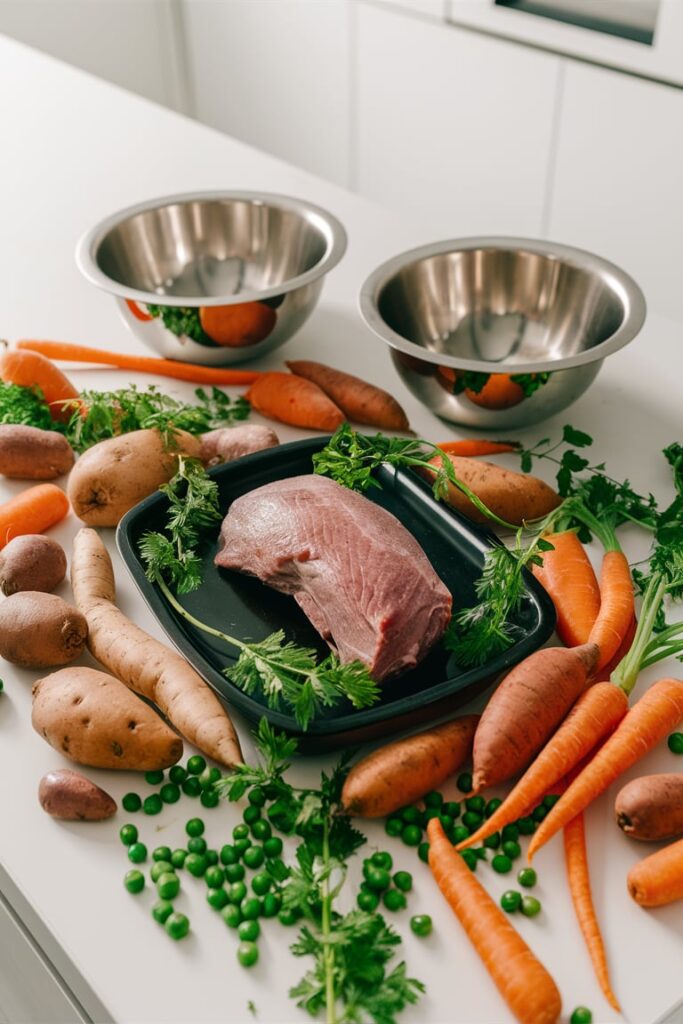
For Goldendoodle owners looking for more control over their dog’s diet, homemade dog food can be a healthy and rewarding option. By preparing meals at home, you can ensure your dog is receiving fresh, high-quality ingredients tailored to their specific dietary needs. This section provides some nutritious and easy-to-make homemade dog food recipes that are ideal for Goldendoodles.
Benefits of Homemade Dog Food for Goldendoodles
Before diving into the recipes, it’s important to understand the benefits of feeding your Goldendoodle homemade food:
- Control Over Ingredients:
- Customization: You can choose high-quality proteins, vegetables, and grains that suit your dog’s taste preferences and dietary needs.
- Avoiding Allergens: Homemade food allows you to avoid common allergens like wheat, soy, and artificial additives that might be present in commercial dog food.
- Freshness and Quality:
- Fresh Ingredients: Homemade meals are prepared with fresh, whole ingredients, which can be more nutritious and appetizing compared to processed commercial foods.
- No Preservatives: Since the food is made at home, you can avoid preservatives and fillers, ensuring your dog’s diet is as natural as possible.
- Tailored Nutrition:
- Specific Needs: Whether your Goldendoodle needs a diet low in fat, high in fiber, or rich in certain vitamins, homemade food can be tailored to meet these needs.
- Portion Control: You can control portion sizes to help manage your dog’s weight, ensuring they stay healthy and fit.
Recipe 1: Chicken and Rice Delight
This recipe is a simple, balanced meal that’s easy to prepare and is gentle on your dog’s stomach, making it perfect for Goldendoodles with sensitive digestion.
Ingredients:
- 2 cups of cooked chicken breast, shredded
- 1 cup of cooked brown rice
- 1/2 cup of diced carrots
- 1/2 cup of peas
- 1 tablespoon of fish oil (for Omega-3 fatty acids)
- 1/4 cup of chopped spinach
Instructions:
- Cook the Chicken: Boil or bake the chicken breast until fully cooked, then shred it into small pieces.
- Prepare the Vegetables: Lightly steam the carrots, peas, and spinach until they are tender.
- Combine Ingredients: In a large bowl, mix the shredded chicken, cooked rice, and vegetables. Add the fish oil and stir well to combine.
- Serve: Allow the food to cool before serving it to your Goldendoodle. Store any leftovers in the refrigerator for up to three days.
Nutritional Benefits:
- High-Quality Protein: Chicken provides lean protein, essential for muscle development and maintenance.
- Healthy Carbohydrates: Brown rice offers a source of energy, along with fiber that aids digestion.
- Vitamins and Minerals: Carrots, peas, and spinach are rich in vitamins A, C, and K, as well as iron and antioxidants.
Recipe 2: Beef and Sweet Potato Stew
This hearty stew is packed with protein, healthy fats, and a variety of vegetables, making it a nutritious option for active Goldendoodles.
Ingredients:
- 1 pound of lean ground beef
- 1 large sweet potato, peeled and diced
- 1/2 cup of green beans, chopped
- 1/2 cup of diced zucchini
- 1/4 cup of chopped parsley
- 1 tablespoon of olive oil
- 1 cup of water or low-sodium beef broth
Instructions:
- Cook the Beef: In a large pot, brown the ground beef over medium heat. Drain off any excess fat.
- Add Vegetables: Add the diced sweet potato, green beans, zucchini, and parsley to the pot with the beef.
- Simmer: Pour in the water or beef broth, and bring the mixture to a boil. Reduce the heat and let it simmer for about 25-30 minutes, or until the vegetables are tender.
- Finish: Stir in the olive oil before serving.
- Cool and Serve: Allow the stew to cool to room temperature before feeding it to your dog. Store leftovers in the refrigerator for up to three days.
Nutritional Benefits:
- Lean Protein: Beef provides essential amino acids that support your dog’s muscle health.
- Complex Carbohydrates: Sweet potatoes are a great source of dietary fiber and beta-carotene, which promotes healthy skin and coat.
- Hydration: The addition of water or broth helps keep your dog hydrated, especially during warmer months.
Recipe 3: Fish and Veggie Medley
This recipe is perfect for Goldendoodles who enjoy fish and need a diet rich in Omega-3 fatty acids for skin and coat health.
Ingredients:
- 2 cups of cooked salmon or white fish (like cod)
- 1 cup of quinoa
- 1/2 cup of steamed broccoli florets
- 1/2 cup of steamed carrots, diced
- 1 tablespoon of flaxseed oil (for extra Omega-3)
- 1/4 cup of blueberries
Instructions:
- Cook the Quinoa: Rinse the quinoa under cold water and cook according to package instructions.
- Prepare the Fish: Bake or steam the fish until fully cooked, then flake it into small pieces.
- Combine Ingredients: In a large bowl, mix the cooked quinoa, fish, broccoli, carrots, and flaxseed oil.
- Top with Blueberries: Add the blueberries as a final touch, providing a burst of antioxidants.
- Serve: Allow the mixture to cool before serving. Store any leftovers in the refrigerator for up to three days.
Nutritional Benefits:
- Rich in Omega-3: Salmon and flaxseed oil are excellent sources of Omega-3 fatty acids, which support skin health and a shiny coat.
- Antioxidants: Blueberries provide antioxidants that help reduce inflammation and support immune health.
- Digestible Carbohydrates: Quinoa is a gluten-free grain that is easy to digest and provides a complete protein.
Special Dietary Needs and Allergies in Goldendoodles
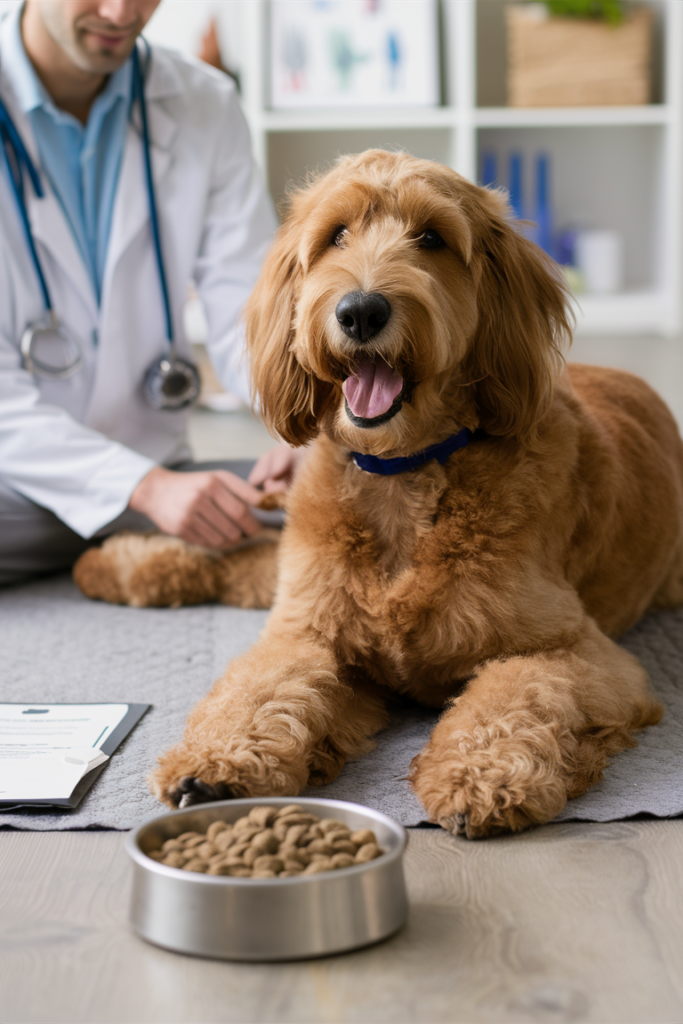
Goldendoodles, like many other dog breeds, can have unique dietary needs and may be prone to certain food allergies or sensitivities. Understanding these special requirements is crucial for maintaining their health and well-being. This section will explore common dietary concerns, how to identify food allergies, and provide guidance on managing these issues with appropriate diets.
Common Dietary Needs in Goldendoodles
Goldendoodles, as a mixed breed, may inherit dietary needs from both their Poodle and Golden Retriever lineage. Here are some common dietary needs to be aware of:
- High-Quality Protein:
- Why It’s Important: Goldendoodles are active dogs that require a diet rich in high-quality protein to support muscle development and overall health.
- Recommended Sources: Look for dog foods that list whole meats like chicken, beef, or fish as the primary ingredient.
- Healthy Fats:
- Why It’s Important: Fats provide essential fatty acids that support brain development, skin health, and a shiny coat.
- Recommended Sources: Include sources of Omega-3 and Omega-6 fatty acids, such as fish oil, flaxseed, and chicken fat.
- Joint Support:
- Why It’s Important: Goldendoodles, especially larger ones, may be prone to joint issues like hip dysplasia, making it essential to include joint-supporting nutrients in their diet.
- Recommended Supplements: Glucosamine and chondroitin are beneficial supplements for maintaining joint health.
- Digestive Health:
- Why It’s Important: Goldendoodles can have sensitive stomachs, so a diet that supports digestive health is essential.
- Recommended Ingredients: Look for dog foods with added probiotics, prebiotics, and easily digestible ingredients like rice and sweet potatoes.
Identifying Food Allergies in Goldendoodles
Food allergies in dogs can manifest in various ways, and it’s important to recognize the signs early to address the issue effectively. Common symptoms of food allergies in Goldendoodles include:
- Skin Irritation:
- Signs: Itching, redness, hot spots, and excessive licking, particularly around the paws and ears.
- Common Allergens: Proteins like beef, chicken, and dairy are common allergens in dogs.
- Digestive Issues:
- Signs: Chronic diarrhea, vomiting, flatulence, and frequent stomach upset.
- Common Allergens: Grains like wheat, soy, and corn, as well as certain preservatives and additives.
- Ear Infections:
- Signs: Recurrent ear infections, characterized by redness, swelling, and a foul odor.
- Common Allergens: Certain proteins and grains are often linked to ear infections in dogs with food sensitivities.
Managing Food Allergies and Sensitivities
If your Goldendoodle is diagnosed with a food allergy or sensitivity, managing their diet becomes a key part of their care. Here’s how to approach it:
- Elimination Diet:
- Process: Start by feeding your dog a novel protein (like venison or duck) and a single carbohydrate source (like sweet potatoes) that they haven’t been exposed to before. This helps identify the allergen by gradually reintroducing potential triggers.
- Duration: Maintain this diet for 8-12 weeks, and monitor for improvement in symptoms.
- Limited Ingredient Diets (LID):
- What It Is: LID dog foods contain fewer ingredients, making it easier to identify and avoid allergens. These diets typically feature a single protein source and a limited number of carbohydrates.
- Brands to Consider: Natural Balance, Blue Buffalo Basics, and Canidae PURE offer high-quality limited ingredient options tailored for dogs with food sensitivities.
- Hypoallergenic Dog Food:
- What It Is: Hypoallergenic dog foods are formulated using hydrolyzed proteins, which are proteins broken down into smaller molecules that are less likely to trigger an allergic response.
- Prescription Options: Brands like Royal Canin and Hill’s Prescription Diet offer veterinary-prescribed hypoallergenic diets for dogs with severe food allergies.
- Grain-Free Diets:
- What It Is: Grain-free dog foods eliminate common allergens like wheat, corn, and soy, replacing them with alternative carbohydrate sources like sweet potatoes, peas, and lentils.
- Considerations: While grain-free diets can be beneficial for some dogs, they should be chosen carefully, as recent studies have linked some grain-free diets to heart issues in dogs. Always consult your veterinarian before making this switch.
- Regular Monitoring and Adjustment:
- Why It’s Important: Managing food allergies requires ongoing attention. Regularly monitor your dog’s condition and adjust their diet as needed to ensure they continue to thrive.
Feeding Guidelines for Goldendoodles
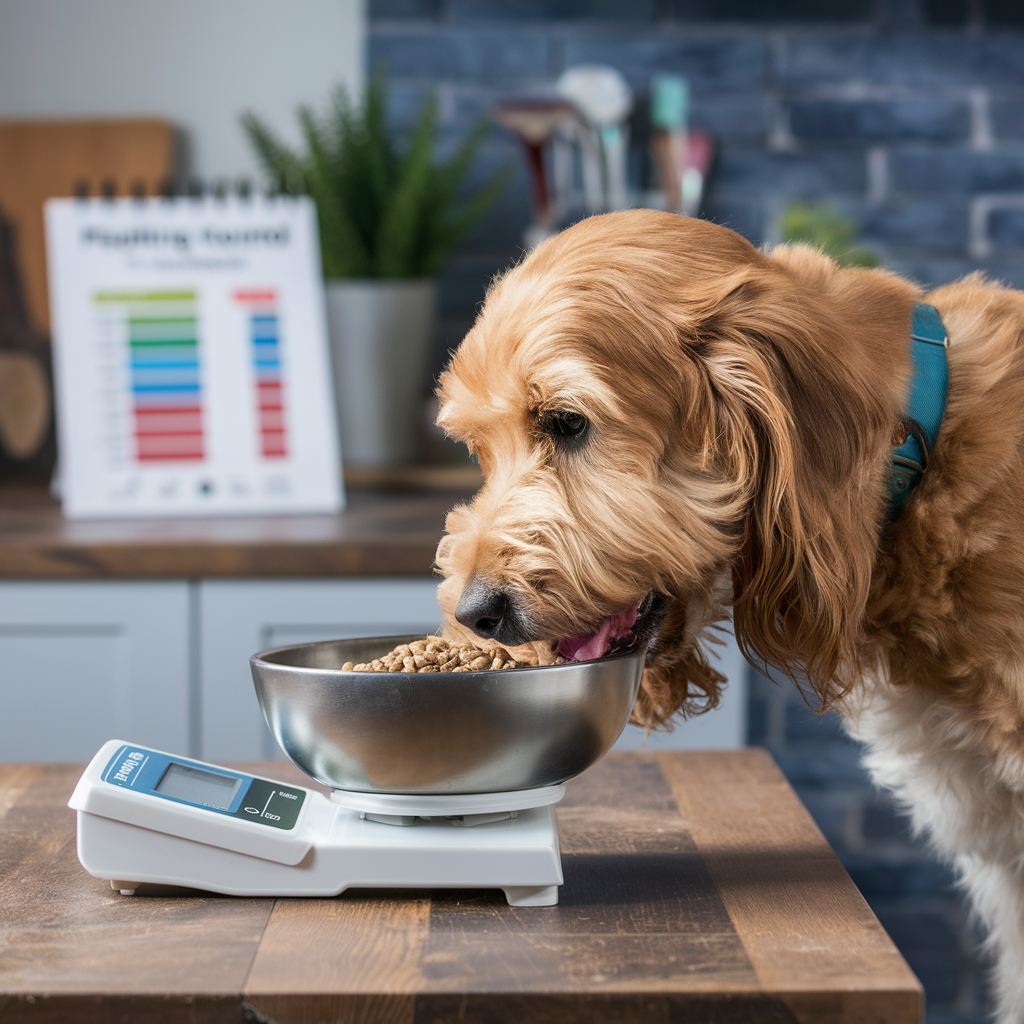
Feeding your Goldendoodle the right amount of food is essential for maintaining their health and well-being. Proper feeding guidelines help ensure they receive balanced nutrition and avoid common issues such as obesity or malnutrition. This section will provide comprehensive feeding guidelines for Goldendoodles, including recommended portion sizes, feeding frequency, and tips for managing weight.
Recommended Portion Sizes
The amount of food your Goldendoodle needs depends on several factors, including their age, size, activity level, and metabolism. Here are general guidelines to help determine the appropriate portion sizes:
- Puppies:
- Feeding Frequency: Puppies should be fed 3-4 times per day until they are about six months old. After this period, you can transition to 2-3 meals per day.
- Portion Size: Follow the feeding guidelines provided by the dog food manufacturer, typically based on the puppy’s weight and age. Puppies need more calories for growth and development, so ensure they receive the appropriate amount of food.
- Adults:
- Feeding Frequency: Adult Goldendoodles should be fed 2 times per day, usually once in the morning and once in the evening.
- Portion Size: The recommended portion size varies based on the dog’s weight and activity level. For a medium-sized Goldendoodle (about 50-60 pounds), the daily amount typically ranges from 2 to 3 cups of high-quality dry food, divided into two meals.
- Seniors:
- Feeding Frequency: Senior Goldendoodles may benefit from smaller, more frequent meals. Feeding 2-3 times per day can help manage their metabolism and prevent digestive issues.
- Portion Size: Senior dogs may require fewer calories due to decreased activity levels. Adjust portion sizes based on their weight, activity level, and any specific health concerns.
Understanding Caloric Needs
To determine the right amount of food for your Goldendoodle, it’s important to understand their caloric needs. Here’s a basic guide to estimating daily caloric intake:
- General Caloric Guidelines:
- Puppies: Typically require about 50-60 calories per pound of body weight per day.
- Adults: Generally need about 30-40 calories per pound of body weight per day, depending on their activity level.
- Seniors: May need fewer calories, about 25-35 calories per pound of body weight per day, due to reduced activity.
- Activity Level Adjustments:
- Active Dogs: Dogs that are highly active or working dogs may require more calories to support their energy needs. Increase their portion size or choose a higher-calorie dog food if necessary.
- Less Active Dogs: For dogs that are less active or prone to weight gain, reduce their caloric intake and monitor their weight closely.
Feeding Frequency and Schedule
Establishing a consistent feeding schedule is crucial for your Goldendoodle’s health and can help regulate their metabolism:
- Consistency:
- Routine: Feed your Goldendoodle at the same times each day to create a routine. Consistent feeding times can help with digestion and prevent overeating.
- Portion Control:
- Measuring Food: Use a measuring cup to ensure you’re providing the correct portion size. Avoid free-feeding (leaving food out all day), as it can lead to overeating and weight gain.
- Treats and Extras:
- Treat Moderation: Treats should not exceed 10% of your Goldendoodle’s daily caloric intake. Choose healthy treats and avoid overindulging.
- Avoid Table Scraps: Avoid giving your dog table scraps or human food, as it can lead to nutritional imbalances and obesity.
Managing Weight and Health
Maintaining a healthy weight is vital for your Goldendoodle’s overall health. Here are some tips for managing their weight:
- Regular Exercise:
- Routine: Ensure your Goldendoodle gets regular exercise to maintain a healthy weight. Daily walks, playtime, and interactive activities can help keep them fit.
- Activity Levels: Adjust their food intake based on their activity levels and weight changes.
- Weight Monitoring:
- Regular Check-Ups: Schedule regular veterinary check-ups to monitor your Goldendoodle’s weight and overall health. Your vet can provide guidance on adjusting their diet as needed.
- Body Condition Score: Learn how to assess your dog’s body condition score to determine if they are at an ideal weight. You should be able to feel their ribs without a thick layer of fat covering them.
- Adjustments:
- Diet Adjustments: If your Goldendoodle is overweight, reduce their portion sizes and choose a weight management dog food. Consult your vet for a tailored weight loss plan.
FAQs About Feeding Goldendoodles
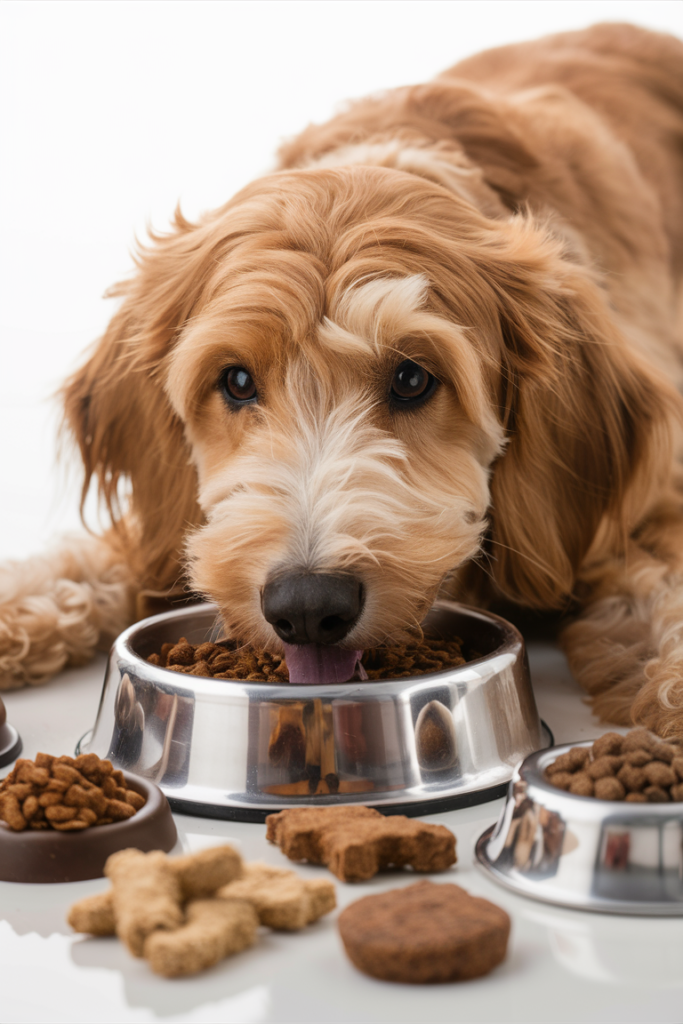
These FAQs cover common concerns and provide additional insights to help you better understand your Goldendoodle’s dietary needs.
How Much Should I Feed My Goldendoodle?
The amount of food your Goldendoodle needs depends on several factors, including their age, size, activity level, and metabolism. Here’s a general guideline:
- Puppies: Feed 3-4 times per day, following the feeding recommendations on the dog food packaging based on their weight and age.
- Adults: Typically require 2-3 cups of high-quality dry food per day, split into two meals. Adjust based on their activity level and weight.
- Seniors: May need fewer calories, so adjust portion sizes and monitor their weight closely.
Always refer to the specific feeding guidelines provided by the dog food manufacturer and consult your veterinarian for personalized recommendations.
What Type of Food Is Best for Goldendoodles?
Goldendoodles thrive on high-quality, balanced dog food that meets their nutritional needs. Look for foods with:
- High-Quality Protein: Sources like chicken, beef, or fish should be the primary ingredient.
- Healthy Fats: Essential fatty acids from sources such as fish oil or flaxseed support coat and skin health.
- Digestive Support: Ingredients like probiotics and prebiotics aid in digestion and overall gut health.
Consider options like premium dry food, wet food, or a combination of both, and always choose products with reputable ingredient sources.
Can I Feed My Goldendoodle Homemade Food?
Yes, homemade food can be a healthy option for Goldendoodles if it’s prepared correctly. Ensure the diet is well-balanced and includes:
- Proteins: Lean meats like chicken, turkey, or fish.
- Carbohydrates: Cooked grains like rice or sweet potatoes.
- Vegetables: Safe vegetables like carrots, peas, and green beans.
- Supplements: Consult your veterinarian about adding necessary supplements, such as vitamins and minerals, to ensure a complete diet.
It’s important to avoid toxic foods and ingredients like onions, garlic, and chocolate.
How Do I Know If My Goldendoodle Has Food Allergies?
Food allergies in Goldendoodles can manifest through various symptoms:
- Skin Issues: Itching, redness, and hot spots.
- Digestive Problems: Diarrhea, vomiting, and gas.
- Ear Infections: Frequent or chronic ear infections with a foul odor.
If you suspect food allergies, consult your veterinarian. They may recommend an elimination diet or hypoallergenic food to identify and manage allergens.
Should I Give My Goldendoodle Treats?
Yes, treats can be part of your Goldendoodle’s diet, but they should be used in moderation:
- Healthy Treats: Opt for low-calorie, nutritious treats that complement their diet, such as small pieces of cooked chicken or specially formulated dog treats.
- Treat Limits: Limit treats to no more than 10% of their daily caloric intake to prevent weight gain and maintain a balanced diet.
Can I Feed My Goldendoodle Table Scraps?
Feeding table scraps is generally not recommended due to:
- Nutritional Imbalance: Table scraps may not meet your Goldendoodle’s nutritional needs and can lead to imbalances.
- Health Risks: Certain human foods, like chocolate, grapes, and fatty foods, can be harmful to dogs.
Stick to high-quality dog food and approved treats to ensure your Goldendoodle receives a balanced and safe diet.
What Should I Do If My Goldendoodle Refuses to Eat?
If your Goldendoodle is refusing food:
- Check for Health Issues: Loss of appetite can indicate health problems. Consult your veterinarian to rule out any underlying issues.
- Adjust Food: Ensure the food is fresh and palatable. Try offering different flavors or brands to see if they have a preference.
- Consistency: Maintain a consistent feeding schedule and avoid giving too many treats or human food, which can disrupt their appetite.

Hi, I’m Ali Tarek, the founder of Animalsman. I’ve always been passionate about pets, especially dogs and cats, and I created this website to share practical tips, easy recipes, and helpful care advice for fellow pet lovers. My goal is to make pet care simple, enjoyable, and accessible for everyone. When I’m not writing or curating content, you’ll usually find me spending time with my furry friends or learning new ways to keep them happy and healthy.

